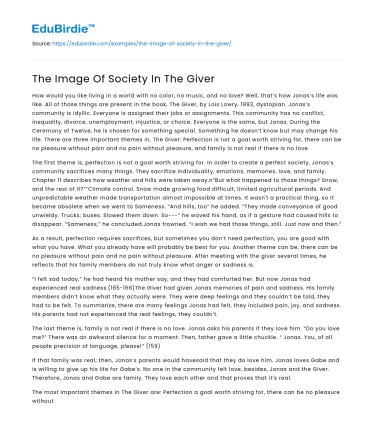How would you like living in a world with no color, no music, and no love? Well, that’s how Jonas’s life was like. All of those things are present in the book, The Giver, by Lois Lowry, 1993, dystopian. Jonas’s community is idyllic. Everyone is assigned their jobs or assignments. This community has no conflict, inequality, divorce, unemployment, injustice, or choice. Everyone is the same, but Jonas. During the Ceremony of Twelve, he is chosen for something special. Something he doesn’t know but may change his life. There are three important themes in, The Giver: Perfection is not a goal worth striving for, there can be no pleasure without pain and no pain without pleasure, and family is not real if there is no love.
The first theme is, perfection is not a goal worth striving for. In order to create a perfect society, Jonas’s community sacrifices many things. They sacrifice individuality, emotions, memories, love, and family. Chapter 11 describes how weather and hills were taken away.n“But what happened to those things? Snow, and the rest of it?”“Climate control. Snow made growing food difficult, limited agricultural periods. And unpredictable weather made transportation almost impossible at times. It wasn't a practical thing, so it became obsolete when we went to Sameness. “And hills, too” he added. “They made conveyance of good unwieldy. Trucks; buses. Slowed them down. So---” he waved his hand, as if a gesture had caused hills to disappear. “Sameness,” he concluded.Jonas frowned. “I wish we had those things, still. Just now and then.”
Save your time!
We can take care of your essay
- Proper editing and formatting
- Free revision, title page, and bibliography
- Flexible prices and money-back guarantee
As a result, perfection requires sacrifices, but sometimes you don’t need perfection, you are good with what you have. What you already have will probably be best for you. Another theme can be, there can be no pleasure without pain and no pain without pleasure. After meeting with the giver several times, he reflects that his family members do not truly know what anger or sadness is.
“I felt sad today,” he had heard his mother say, and they had comforted her. But now Jonas had experienced real sadness.(165-166)The Giver had given Jonas memories of pain and sadness. His family members didn’t know what they actually were. They were deep feelings and they couldn’t be told, they had to be felt. To summarize, there are many feelings Jonas had felt, they included pain, joy, and sadness. His parents had not experienced the real feelings, they couldn’t.
The last theme is, family is not real if there is no love. Jonas asks his parents if they love him. “Do you love me?” There was an awkward silence for a moment. Then, father gave a little chuckle. “ Jonas. You, of all people precision of language, please!” (159)
If that family was real; then, Jonas’s parents would havesaid that they do love him. Jonas loves Gabe and is willing to give up his life for Gabe’s. No one in the community felt love, besides, Jonas and the Giver. Therefore, Jonas and Gabe are family. They love each other and that proves that it’s real.
The most important themes in The Giver are: Perfection a goal worth striving for, there can be no pleasure without pain and no pain without pleasure, and family is not real if there is no love. This book gives us a way to think about a world with no color, emotions, family, and love. It’s so powerful because while reading this book, we are reminded how lucky we are to live in this world. I loved this book, and I would rate it a 10/10! I enjoyed reading it and loved the suspense. I would recommend this to people of all ages but I can guarantee that you won't be putting the book down without thinking or looking at the world in a totally different way.
Works Cited
- Lowry, Lois. The Giver. New York: Houghton Mifflin Harcourt Publishing Company, 1993.






 Stuck on your essay?
Stuck on your essay?

